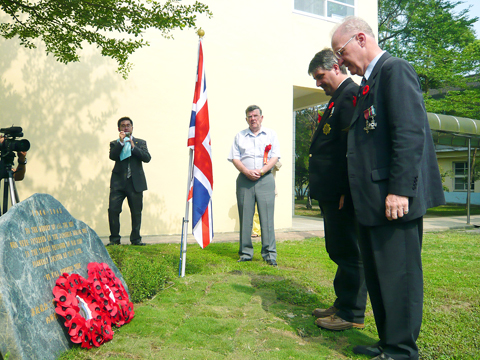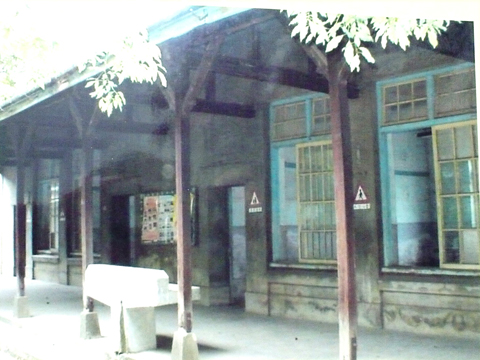Walking around the quiet, leafy campus of Gouba Elementary School in Douliou (斗六), Yunlin County, it is hard to imagine that the school was once used to house prisoners of war (POW) during World War II.
But from November 1944 until the end of the war, the school was home to the Toroku, or Douliou, POW Camp of the Imperial Japanese Army, or what POWs called “The Schoolhouse Camp.” Hundreds of US and British POWs were interned at the site before being moved to Shirakawa in Japan.

PHOTO: MO YAN-CHII
The location of the former camp was not confirmed until September 2000 when the Taiwan POW Camps Memorial Society visited the school in a bid to preserve the Japanese-style classrooms.
The original building, however, was torn down in 2003 out of safety concerns. The organization continued to communicate with the school, and was finally granted permission to erect a marble memorial at the site earlier this year.
“We should never forget the past. It’s not just a stone that we put up there, it’s what it meant for the POWs ... It is also an important piece of history for Taiwan and the local community,” said Michael Hurst, director of the organization.

PHOTO: MO YAN-CHIH, TAIPEI TIMES
Hurst traveled to the school with members and supporters of the organization on Saturday to commemorate the establishment of the memorial. At the ceremony, he told stories of the former POWs — who were too old to travel to Taiwan for the ceremony — to a group of school students and community members.
“All the surviving POWs are in their 80s or 90s, and it’s difficult for them to travel this far, and we don’t expect to see them coming back for memorials in the future,” Hurst said.
Although unable to be present at the memorial ceremony on Saturday, several POWs who had lived in the school camp shared their stories via e-mails.
“My work while I was there consisted of taking care of the vegetable garden plants ... we were always hungry and our thoughts were always of survival and getting back home,” US Army veteran Carl Pasurka said in an e-mail to the organization.
Raymond Harper of the US Navy said the POWs slept on cement floors in the classrooms and lived on rice and thin soup that only occasionally included vegetables.
Another POW, Alcide Benini of the US Army, described the Japanese commander in the school camp as a “pleasant man,” saying he had “probably the best Christmas as a POW” in 1944 because he helped lead church services.
Hurts said most of the POWs in the camp were in terrible physical condition, so they were not worked like slaves, as many were at the infamous “Hell Camp” in Kinkaseki, or Jinguashih (金瓜石), Taipei County. Some said they received good treatment in the camp during their imprisonment.
Gouba Elementary School principal Hsu Ching-hsuen (徐慶勳) said the school tore down the classrooms because of the lack of government subsidies for restoration work. However, he said the school valued what had happened on the school grounds and would pass on the history to its students.
Hsu said it was great to learn that local residents were friendly to the POWs, giving them sweet potatoes and cigarettes.
Still, the time in the school camp, as in the other 14 camps found in Taiwan, is an unbearable and dark memory for most POWs.
Although not a POW, Arthur Scholl, an 82-year-old US Navy veteran who now lives in Taipei, shared the pain of the POWs and the trauma the war has left them with.
“It’s only when I started to associate with the Taiwan POW Society that I was able to tell the stories in the wars,” he said.
Scholl talked in private about his experience fighting in World War II in the Philippines, in which he was almost killed on aircraft carrier, but was unable to speak at the ceremony because he was overcome with emotion.
The Japanese listed 4,344 POWs in Taiwan, with 15 POW camps. Except for the camp in Jinguashih, where some of the original structures remain, the other camps have been destroyed almost completely, Hurst said.
The recognition of the sites, however, will continue, he said.
The organization plans to hold a memorial ceremony at the remnants of the walls of Taipei Prison on Jinshan S Road on June 20 to commemorate the POWs who were executed in the old prison. It also plans to erect two more memorials at school camps in Yunlin County.
The stories of the POWs will be told even though the former POWs who spent part of their lives in Taiwan were unlikely to come to the island to tell their experiences in person.
“Our goal now is to bring their children and grandchildren here, and help them learn the past of their dads and granddad,” Hurst said.

Trips for more than 100,000 international and domestic air travelers could be disrupted as China launches a military exercise around Taiwan today, Taiwan’s Civil Aviation Administration (CAA) said yesterday. The exercise could affect nearly 900 flights scheduled to enter the Taipei Flight Information Region (FIR) during the exercise window, it added. A notice issued by the Chinese Civil Aviation Administration showed there would be seven temporary zones around the Taiwan Strait which would be used for live-fire exercises, lasting from 8am to 6pm today. All aircraft are prohibited from entering during exercise, it says. Taipei FIR has 14 international air routes and

Taiwan lacks effective and cost-efficient armaments to intercept rockets, making the planned “T-Dome” interception system necessary, two experts said on Tuesday. The concerns were raised after China’s military fired two waves of rockets during live-fire drills around Taiwan on Tuesday, part of two-day exercises code-named “Justice Mission 2025.” The first wave involved 17 rockets launched at 9am from Pingtan in China’s Fujian Province, according to Lieutenant General Hsieh Jih-sheng (謝日升) of the Office of the Deputy Chief of the General Staff for Intelligence at the Ministry of National Defense. Those rockets landed 70 nautical miles (129.6km) northeast of Keelung without flying over Taiwan,

City buses in Taipei and New Taipei City, as well as the Taipei MRT, would on Saturday begin accepting QR code payments from five electronic payment providers, the Taipei Department of Transportation said yesterday. The new option would allow passengers to use the “transportation QR code” feature from EasyWallet, iPass Money, iCash Pay, Jkopay or PXPay Plus. Passengers should open their preferred electronic payment app, select the “transportation code” — not the regular payment code — unlock it, and scan the code at ticket readers or gates, General Planning Division Director-General Liu Kuo-chu (劉國著) said. People should move through the

The Ministry of National Defense (MND) today released images of the military tracking China’s People's Liberation Army (PLA) movements during the latest round of Chinese drills around Taiwan. The PLA began "Justice Mission 2025" drills today, carrying out live-fire drills, simulated strikes on land and maritime targets, and exercises to blockade the nation's main ports. The exercises are to continue tomorrow, with the PLA announcing sea and air space restrictions for five zones around Taiwan for 10 hours starting from 8:30am. The ministry today released images showing a Chinese J-16 fighter jet tracked by a F-16V Block 20 jet and the